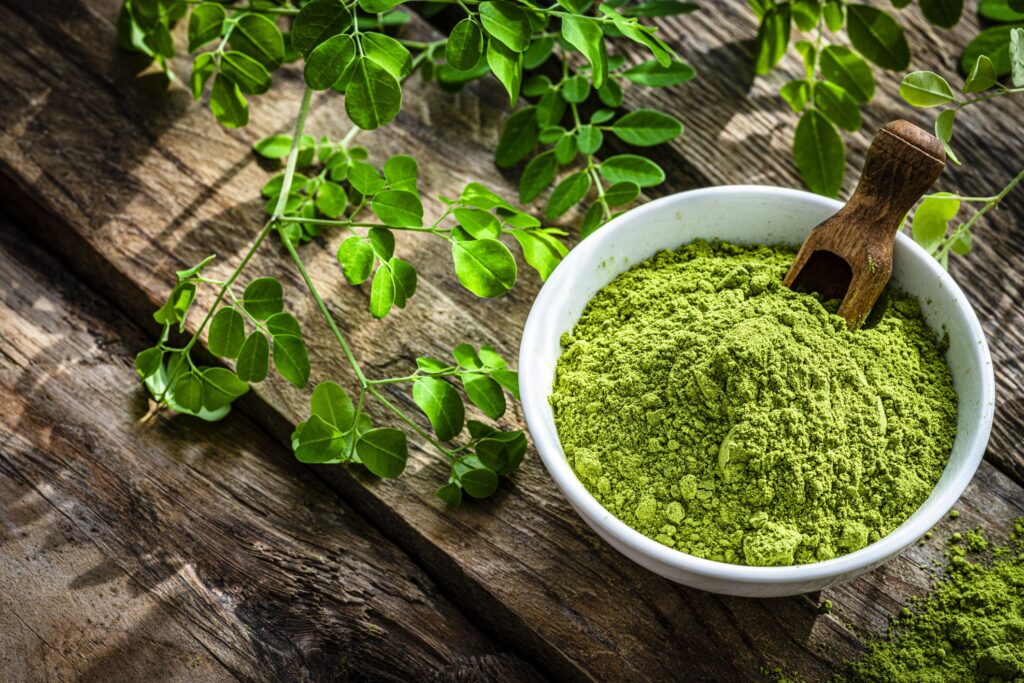Medicinal research and application never stop on the unending health benefits of Moringa. Moringa has natural herbs with vast natural nutritient and qualities that can be extensively used as a health-promoting food additive because of its potent protection against various diseases and the recent widespread of environmental toxins.
According to recent research from the Center of Biotechnology, Moringa has been subjected to different laboratory examinations to ascertain its full health benefits to humans. Most of this research has validated that phytochemicals, glucosinolates, and carotenoids in Moringa are responsible for several health benefits such as diabetic control, anti-cancer, anti-inflammation, and anti-bacterial.
Moringa oleifera is a member of the Moringaceae family, which is common in tropical and arid regions like India and Africa. It is known a horseradish tree, ben tree, or drumstick tree. Eastern countries use Moringa to treat and prevent diseases such as diabetes, heart disease, anemia, arthritis, liver disease, and respiratory, skin, and digestive disorders.
Moringa oleifera is a versatile plant with vast quality to serve as medicine, food, and other industrial and household purposes for man. Every part of a moringa tree is valuable and productive.

Here are 10 proven health benefits of moringa:
Moringa is anti-hypertension
Moringa contains some biological properties such as crypto-chlorogenic acid, astragalin, and iso-quercetin is vital phytochemicals that carry out anti-hypertension functions in the body. According to research, these properties help the tissues and organs in the cardiovascular region to relax and perform better.
Moringa improves Milk production in pregnant women and nursing mothers. Indian and Asia women use fresh Moringa leaves to increase milk production during lactation. Research has backed these benefits by pointing to the diuretic elements in the herb’s leaves.
Traditionally, moringa is used in Africa to kill parasites in the human body. When moringa leaves are used for concoction, it removes intestinal worms from the abdomen.
Moringa is anti-inflammation.
Inflammation can lead to chronic diseases like diabetes, respiratory problems, cardiovascular disease, arthritis, and obesity. Moringa reduces inflammation by suppressing inflammatory enzymes and proteins in the body. Moringa leaf concentrate can significantly lower inflammation in the cells.
It improves brain health.
Moringa improves the condition of the brain by enhancing cognitive function with its antioxidant and neuro-enhancers. It is also been tested as a treatment for Alzheimer’s disease with favorable preliminary results.
Its high content of vitamins E and C fight oxidation that leads to neuron degeneration, improving brain function. It’s also able to normalize the neurotransmitters serotonin, dopamine, and noradrenaline in the brain, which play a role in memory, mood, organ function, responses to stimuli such as stress and pleasure, and mental health for example in depression and psychosis.
It regulates blood sugar.
Moringa leaf powder has been effective at regulating lipid, glucose, and oxidative stress in diabetic patients. When the blood sugar increases, the anti-diabetic elements in moringa such as the polyphenols regulate the glucose level.
It protects the cardiovascular system.
Moringa leaf powder has heart-healthy benefits, particularly in blood lipid control, the prevention of plaque formation in the arteries, and reduced cholesterol levels. Moringa leaves relax the heart muscles and tissues to ensure the easy flow of blood. It also prevents heart disease.
It is nutritious
Moringa is rich in vitamins, minerals, and amino acids. It contains significant amounts of vitamins A, C, and E; calcium; potassium; and protein. It is rich in all-round nutrition when consumed as food. Moringa is essential for culinary purposes such as spice, salads, and grilling.
It prevents cell damage.

Moringa contains antioxidants such as flavonoids, polyphenols, and ascorbic acid in every part of moringa to prevent inflammation and cell damage.
A study found that Moringa leaf extracts have higher antioxidant activity, free-radical scavenging capacity, and higher inhibition of lipid, protein, and DNA oxidation than flowers and seeds. This implies that it prevents the damage of essential cells in the body. It prevents all other oxidative stress and pain.
It protects the liver.
Moringa can reduce liver damage and fibrosis and reverse oxidation in the liver. Moringa oil can also restore liver enzymes to normal levels, reducing oxidative stress, and increasing protein content in the liver.
Moringa has blood-clotting properties in its leaves, roots, and seeds that enhance wound healing and can reduce clotting time. It reduces the time it takes for scratches, cuts, or wounds to stop bleeding.
How Moringa can be used for health purposes
It can be used in the Kitchen:
Moringa can be used for different culinary purposes. It is good in soup and food. Moringa can be used as a spice for soups and stews. Some use it as salad, while others use it like other vegetables.
Moringa as herbal tea:
Moringa leaves and seeds, when dried and smoothened into powder can be used to make tea. Research has shown that moringa is mostly consumed as tea for medicinal purposes.
Moringa as fruit juice:
Factories are now using moringa as juice. It retains its natural medicinal qualities when consumed.
Moringa as lotion and cream:
Moringa can be mixed with cream and lotion for different purposes. It is often used to smoothen the skin and treat other external inflammation.
Moringa as tincture and concoction:
Traditionally, moringa is consumed in tincture and concoction form. When dried, it is mixed with hot water.
Moringa can have laxative effects in large quantities, so a safe dose to introduce it into your diet and avoid digestive problems is ½ to 1 teaspoon per day.

